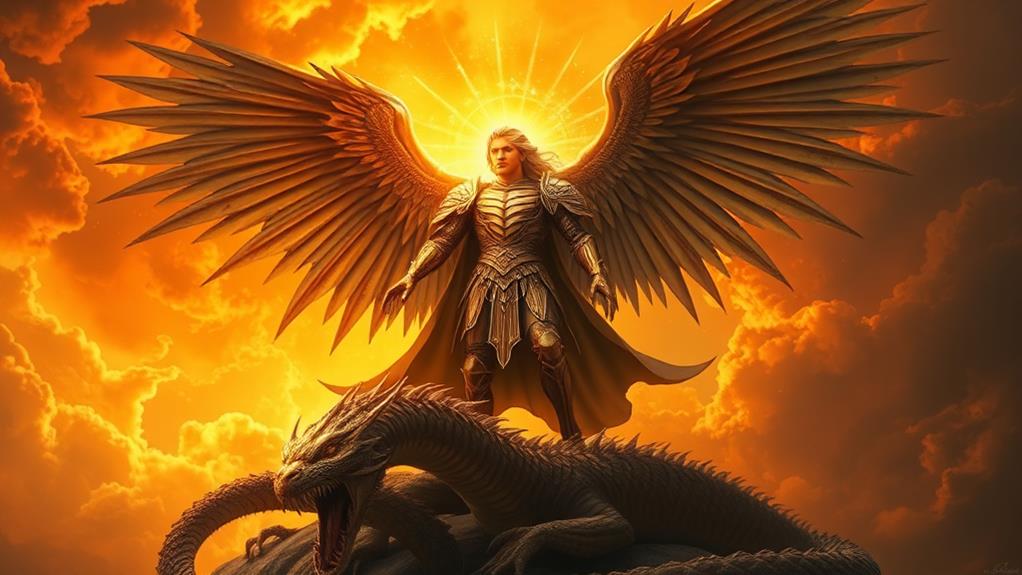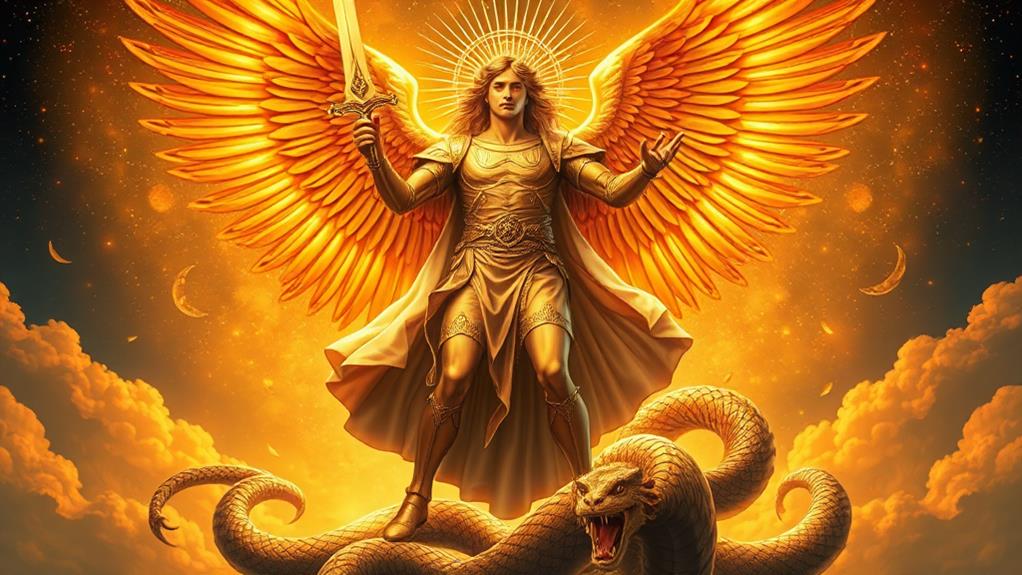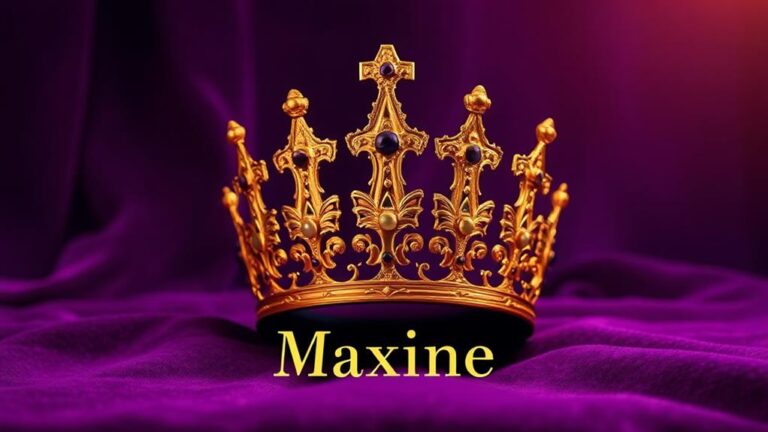Michael Name Meaning in the Bible
The name Michael originates from the Hebrew name Miḵa’el, meaning “who is like God?” Derived from the Hebrew components mi, ke, and ‘el, it symbolizes God’s uniqueness and authority. In the Bible, Michael is borne by various figures, including a spy, a warrior supporting David, and most prominently, the archangel Michael. As the heavenly patron and protector of Israel, Michael the archangel is depicted as a defender and leader in the war against evil forces. His role emphasizes divine protection, advocacy, and spiritual guidance, inspiring trust in God’s sovereignty. Exploring Michael’s significance further reveals profound lessons on spiritual warfare and devotion.
Key Takeaways
- The Name Michael: Derived from the Hebrew name Miḵaʾel, meaning “who is like God?”, it reflects God’s uniqueness and authority.
- Biblical Interpretation: The name Michael is a rhetorical question, implying no one is like God, emphasizing divine transcendency.
- Biblical Characters: Michael is used for various biblical figures, including a spy, a warrior, and the archangel Michael, symbolizing strength and divine guidance.
- Spiritual Significance: Michael represents divine protection, advocacy, and the powerful intervention of God, inspiring trust in divine guidance.
- Archangel Michael: In the Bible, he is a key figure, a protector of Israel, and a leader in the war against Satan, symbolizing justice and righteousness.
Michael’s Hebrew Origins

The name Michael originates from the Hebrew name *מִיכָאֵל (Miḥa’el)*, which is derived from three Hebrew components: *מִי (mi)*, an interrogative pronoun meaning “who?”; *כְּ (ke)*, a particle of comparison meaning “like”; and *אֵל (‘el)*, meaning “God.” This etymological breakdown results in the name Michael being commonly translated as “who is like God?”
The Hebrew roots of the name Michael underpin its profound Biblical significance, symbolizing a rhetorical query that underscores the uniqueness and authority of God. The biblical significance of names often highlights their spiritual essence, and Michael is no exception.
The combination of these Hebrew components not only forms the basis of the name’s meaning but also encapsulates its spiritual essence. The use of “mi” and “ke” with “el” creates a powerful question that invites reflection on the divine.
In the Bible, Michael is associated with the archangel who champions God’s people, emphasizing the name’s connection to divine power and protection. This deep-rooted meaning makes Michael a name that conveys strength and spiritual importance, resonating with individuals seeking a deeper connection to their faith.
Meaning and Etymology
Derived from the Hebrew name *מִיכָאֵל (Miḵaʾel)*, Michael‘s etymology is rooted in three Hebrew components: *מִי (mi)*, an interrogative pronoun meaning “who?”; *כְּ (ke)*, a particle of comparison meaning “like”; and *אֵל (ʾel)*, meaning “God.”
These components combine to form a rhetorical query that translates as “who is like God?,” emphasizing the uniqueness and authority of God. The name Michael embodies spiritual qualities of strength, courage, and divine protection, similar to the symbolism found in the name Robert, which also reflects a legacy of robust character and leadership in biblical contexts symbolizes strength and wisdom.
A linguistic analysis of the name Michael reveals its significance in both Jewish and Christian traditions. It is linked to the archangel Michael, who is often portrayed as a powerful protector and leader.
The name’s cultural significance extends beyond its religious connotations, as it has been a popular choice for males across various cultures and languages, often symbolizing strength, courage, and divine guidance.
The meaning of Michael serves as a reminder of the transcendent nature of God, underscoring the idea that no human can compare to His majesty and power. This theological concept is fundamental to understanding the name’s etiology and its enduring appeal in religious and secular contexts alike.
Biblical Characters Named Michael

The Michaels include a spy from the tribe of Asher sent by Moses to scout Canaan (Numbers 13:13), a son of Izrahiah from the tribe of Issachar (1 Chronicles 7:3), a Benjaminite (1 Chronicles 8:16), a warrior who supported David (1 Chronicles 12:20), and the father of Omri, a leader from Issachar (1 Chronicles 27:18). These individuals highlight various virtues and teachings, such as wisdom, community service, loyalty, and leadership, reflecting the spiritual significance of names in the Bible.
In contrast, Michael the archangel is prominently featured in the Bible, engaging in archangel battles and offering angelic protection. He is described as a chief prince who stands guard over Israel (Daniel 12:1), battles Satan over Moses’ body (Jude 1:9), and leads the heavenly armies against the dragon (Revelation 12:7). His role underscores divine protection and the cosmic struggle between good and evil, providing lessons on trust in God’s sovereignty and spiritual warfare.
Spiritual Significance of Michael
The spiritual significance of Michael in the Bible is profound, reflecting the importance of divine protection and advocacy. As an archangel, Michael is depicted as a defender and protector of Israel and the faithful, standing out as a champion of righteousness and justice in texts such as Daniel and Revelation. His role symbolizes the powerful intervention of God in the lives of His people, inspiring trust and reliance on divine guidance and protection.
Michael embodies qualities similar to those associated with the name Aiden, representing divine presence and the transformative power of faith, as seen in the symbolism of light and purification in biblical teachings. This connection invites believers to embrace a life filled with spiritual fervor and devotion to God.
Biblical Origins of Michael
Michael, a name deeply rooted in the Hebrew Bible, originates from the Hebrew term “Mikha’el,” which translates to “who is like God?” This rhetorical query encapsulates the spiritual significance of Michael, emphasizing his unique role as an intercessor and guardian of God’s people. The name Michael is composed of three parts: “mi” (who?), “ke” (like), and “el” (God), reflecting an inquiry about the nature and identity of God.
In the biblical context, Michael is portrayed as a high-ranking figure within the angelic hierarchy, often referred to as the archangel Michael. His role as a guardian angel is underscored in the Book of Daniel, where he is described as “one of the chief princes” (Daniel 10:13) and “the great prince who has charge of your people” (Daniel 12:1).
The New Writing further depicts Michael as the leader of the heavenly host, engaging in a battle against Satan and his angels (Revelation 12:7-9). This emphasizes Michael’s pivotal role in protecting God’s people and standing against evil forces. By understanding the origins of Michael’s name, we gain insight into his divine responsibilities and spiritual importance.
Symbolism and Spiritual Role**
Symbolic of divine power and spiritual guardianship, the name Michael embodies a profound spiritual significance. It represents a protector who stands between the believer and the spiritual world, offering spiritual protection against forces of darkness. In the biblical setting, Michael is portrayed as a divine messenger, entrusted with the mission of conveying God’s will and safeguarding His people.
The spiritual role of Michael is multifaceted. As an archangel, he is depicted as a warrior, fiercely defending the faithful against the enemy. His name, meaning “who is like God?”, underscores his divine mandate and the authority he wields in the spiritual sphere.
Additionally, Michael’s role as a guardian and protector emphasizes his commitment to safeguarding the believer’s soul and spirit. Within this framework, the name Michael serves as a reminder of God’s unwavering protection and divine intervention in the lives of His people. This profound symbolism underscores the importance of the name Michael, highlighting its deep spiritual roots and the divine attributes associated with it.
Michael the Archangel

The biblical name Michael, stemming from the Hebrew *מִיכָאֵל (Mikha’el)* meaning “who is like God?”, holds significant importance in both the Old and New Scriptures. Michael the Archangel is prominently featured as the heavenly patron and champion of Israel, protecting the people of God against earthly and devilish foes, and leading the angelic armies in the war in heaven against Satan (Revelation 12:7, Jude 1:9).
In Daniel, Michael is described as “one of the chief princes” and the “great prince” who stands guard over the people of Israel (Daniel 10:13, 12:1).
Michael’s Name Origin
In biblical context, the origin of the name Michael is rooted in Hebrew, deriving from the phrase “מִיכָאֵל” (Mikha’el), which translates to “who is like God?” or “who resembles God?” This rhetorical question, composed of “מִי” (mi) meaning “who,” “כ” (equivalent) signifying “like,” and “אֵל” (el) referring to God, underscores the unique and powerful nature of the divine. The name Michael encapsulates an inquiry into the identity of God, inspiring humans to seek and understand His character.
The biblical significance of the name Michael is profound, as it is borne by various characters throughout the Old and New Scriptures, including the archangel Michael, who is depicted as a protector of Israel and the leader of heavenly armies against Satan.
The etymology of the name Michael provides a foundation for its deeper meaning, reflecting a call to explore and appreciate God’s unfathomable qualities and His role in humanity’s spiritual journey. Through its origins, the name Michael conveys a powerful message of divine reverence and awe.
Archangel Michael’s Role
Archangel Michael’s role in the biblical narrative is multifaceted and profound, reflecting the powerful and protective qualities encapsulated in the name “Michael.” As explored previously, the name Michael, derived from the Hebrew phrase “Mikha’el,” meaning “who is like God?” or “who resembles God?” underscores the divine nature and authority attributed to the bearer of this name.
In the biblical context, Michael is depicted as a “chief prince” among the angels, indicating a high rank within the angelic hierarchy[1,3]. His role in spiritual warfare is particularly notable, as he is mentioned as contending against the “prince of the kingdom of Persia” and other evil spirits[1,3]. This spiritual combat is essential in protecting the people of God, especially during the end times[1,3].
Revelation 12:7-9 vividly describes Michael as the leader of the heavenly armies, engaged in a decisive battle against Satan and his angels, resulting in the latter’s defeat and expulsion from heaven. This illustrates Michael’s critical role in safeguarding believers from the forces of evil and reinforcing the divine plan of salvation[1,3]. His protective intercession is a testament to his enduring commitment to God’s people.
Biblical References**
Biblical references to Michael the archangel are scattered throughout the Old and New Scriptures, revealing his pivotal role in divine plans. These references offer essential insights into Michael’s functions, underscoring his importance as a powerful angelic being.
Key passages in the Book of Daniel (10:13, 21; 12:1) portray Michael as a chief prince, emphasizing his authoritative role in protecting the children of Israel. In Daniel 10:13, he is described as “one of the chief princes” who assists the angel speaking to Daniel, illustrating his capacity to intervene in heavenly battles.
In the New Testament, Jude 1:9 highlights Michael’s dispute with the devil over Moses’ body, showcasing his role in spiritual combat. Revelation 12:7-9 vividly describes Michael’s leadership in the heavenly war against Satan, symbolizing his strength and victory.
These biblical interpretations underscore Michael’s symbolism as a protector and warrior, aligning with his depiction in various angelic hierarchies. By examining these references, we gain a profound understanding of Michael’s heavenly battles and his significance within the divine narrative. His actions and characteristics underscore the intricate balance between divine will and human destiny, inspiring reverence and awe.
Historical Context in the Bible
In the biblical context, the name Michael is not only symbolic of divine power and protection but also signifies a rhetorical question that underscores the incomparability of God. Various figures in the Bible bear the name Michael, including the father of Sethur, a leader from Manasseh, and a captain in King David’s army. These references illustrate the cultural significance and diverse interpretations of the name Michael, highlighting its association with leadership, authority, and spiritual defense.
The historical context of Michael in the Bible provides a rich tapestry of symbolic meanings and cultural interpretations that have resonated throughout history.
Symbolic Interpretations of Michael

- Protector and Defender: Michael is depicted as a warrior, armed with a sword and shield, symbolizing his role in protecting the faithful from evil.
- Scales of Justice: He is often shown with weighing scales, highlighting his involvement in meting out justice and ensuring fairness in both the spiritual and physical domains.
- Spiritual Warrior: His association with banners and spheres signifies his leadership and strength in spiritual battles, emphasizing his commitment to defending righteousness and vanquishing evil.
These symbolic interpretations underscore the multifaceted role of Michael in biblical narratives, emphasizing his spiritual significance as a guardian, protector, and champion of justice and righteousness.
Michael’s Role in Revelation**
The Archangel Michael plays a pivotal role in the Book of Revelation, where he is portrayed as a key figure in the apocalyptic struggle between good and evil. This heavenly protector is depicted as the leader of the angelic armies that engage in celestial battles against the forces of darkness led by Satan.
The most notable mention of Michael in Revelation is found in Chapter 12, verse 7, where he leads the heavenly forces in a final confrontation with the dragon, symbolizing Satan, and emerges victorious.
Through Michael’s role in Revelation, we see the embodiment of his name’s meaning, “who is like God?”, as he acts with divine authority and strength to defend the faithful. His leadership in angelic battles underscores his status as a powerful protector and advocate for those who stand against evil.
This portrayal of Michael serves as a source of inspiration and hope, emphasizing the ultimate triumph of good over evil under the guidance of this heavenly guardian.
Frequently Asked Questions
Is Michael a Name Suitable for a Non-Christian Child?
The name Michael can be suitable for a non-Christian child due to its broad cultural significance and historical depth, transcending religious boundaries. It is known across various cultures and has been borne by historical figures from diverse backgrounds, embodying universal values such as strength and protection.
How Common Is the Name Michael Globally?
Michael remains a globally prevalent name, with regional variations in popularity. Historically, it was the most popular boys’ name in the United States from 1954 to 1998, and its significance is maintained through diverse cultural and linguistic forms, such as Miguel and Mikhail.
What Are Popular Nicknames for Michael?
“A name is the blueprint of the thing we call a person,” so choosing a nickname is essential. Popular nicknames for Michael include Mike, Mikey, Mick, and Mickey. Significantly, variations like Miguel (Spanish) and Mikhail (Russian) are also used. Famous Michaels like Michael Jackson and Michael Jordan embody the versatility of the name.
Can Michael Be Used as a Feminine Name?
Michael can be used as a feminine name, albeit rarely, reflecting personal preferences and family traditions that challenge traditional gender stereotypes. Historical significance shows that while Michael is mainly masculine, variations like Michaela and Michelle offer feminine alternatives, embracing diversity and freedom in naming choices.
Does Michael Have Equivalents in Other Cultures?**
Illuminated by the wings of the archangel, Michael’s essence transcends cultures. In Judaism, it symbolizes “Who is like God?” while in Islam, Michael (Mika’el) is the Angel of Mercy, bringing sustenance to all. Equivalents abound in Italian (Michele), Spanish (Miguel), and French (Michel).
Names Reflecting Grace and Strength
- Mackenzie Name Meaning in the Bible
- Michael Name Meaning in the Bible
- Mary Name Meaning in the Bible
- Mia Name Meaning in the Bible
- Mark Name Meaning in the Bible
Conclusion
The name Michael, originating from the Hebrew *מִיכָאֵל* (Mikha’el), translates to “Who is like God?” or “What is God like?” This rhetorical question emphasizes the uniqueness and incomparability of God. In the Bible, Michael appears as a protector of Israel and as the archangel who leads the heavenly armies against Satan. Symbolically, the name represents authority, leadership, and victory over evil. Like a beacon shining brightly across the ages, Michael’s name embodies the spiritual power and divine connection that surpasses human understanding. Through biblical narratives and apocalyptic visions, Michael’s role underscores the eternal battle between light and darkness, with his name standing as a testimony to the triumph of the divine.






